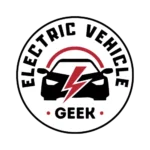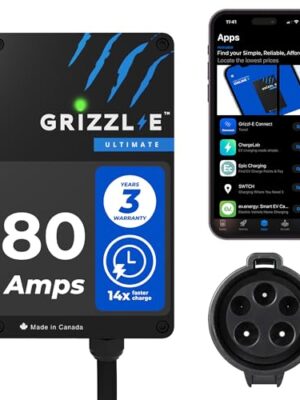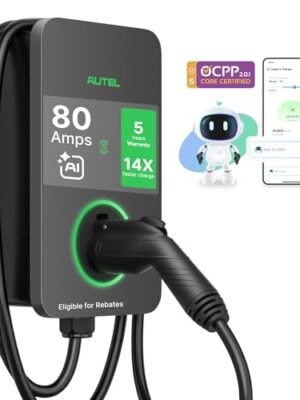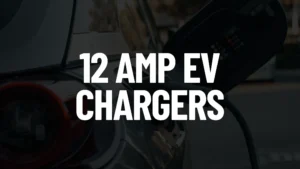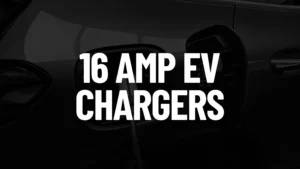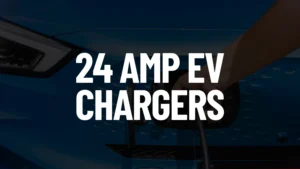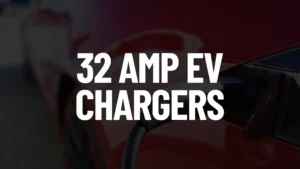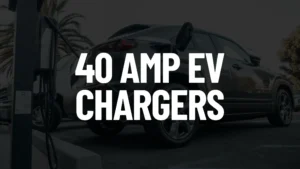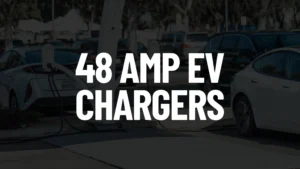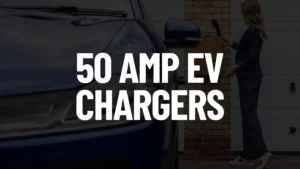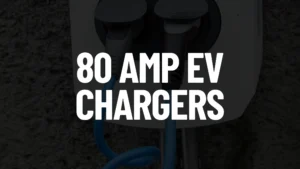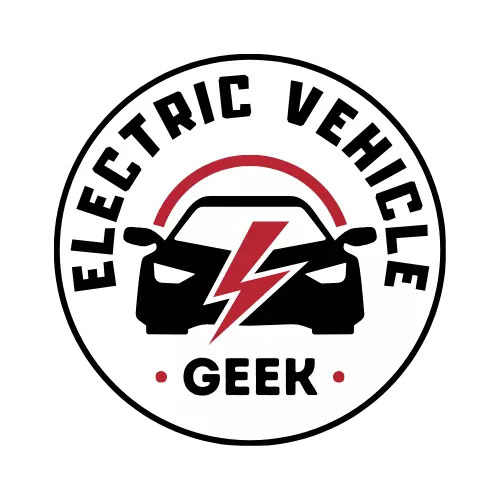Supported by you via insider access, and when you purchase through links on our site, we may earn an affiliate commission. See our Affiliate Disclosure.
80 AMP EV Chargers Reviews 2025
We have hand-picked some of the best 80 Amp EV chargers that can be used as fast home EV chargers, business EV chargers, workplace EV chargers, or commercial EV chargers.
Explore our handpicked selection of some of the best 80 Amp EV chargers – engineered for high-speed charging at home, in the workplace, or at commercial sites. These hardwired 80-amp EV chargers deliver up to 19.2 kW of power, adding approximately 75 miles of range per hour on a 240V circuit.
We recommend 80A EV chargers for locations with sufficient electrical capacity to support a dedicated 100-amp circuit. They’re ideal for large-battery EVs, multi-EV households, and high-usage environments. Available with Tesla/NACS or J1772 connectors, depending on the model.
See All 80 Amp EV Charger (J1772 or Tesla/NACS)
What Is a 80 Amp EV Charger?
An 80-amp EV charger is a high-powered Level 2 electric vehicle charger that delivers up to 19.2 kW of power at 240 volts. This translates to approximately 75 miles of range per hour, making it the fastest Level 2 AC charging option available for residential use. These chargers are ideal for homes with high electrical capacity, as well as business, workplace, and commercial EV charging stations, where rapid turnaround is critical.
80 Amp EV Charger Circuit Requirements
Due to their high power demand, 80-amp EV chargers require heavy-duty wiring, including 2 AWG solid copper conductors for the hot lines and an 8 AWG copper ground conductor. The charger must be installed on a dedicated 100-amp circuit protected by a 100-amp circuit breaker. This setup must be supported by either a 200-amp main electrical panel or a dedicated 100-amp sub-panel. Most 80A chargers are hardwired only, and professional installation is recommended to ensure compliance with the National Electrical Code (NEC) and local regulations.
Hardwired 3-Wire 80 Amp EV Charger Circuit Wiring Diagram
A hardwired 3-wire 80 Amp EV charger wiring configuration setup typically includes two 2 AWG copper conductors – black (L1) and red (L2) – and one 8 AWG copper grounding conductor (green), all rated for 90°C or higher. Power is supplied from a dedicated 100-amp double-pole breaker in the electrical panel, with wiring routed through conduit to either a junction box or directly to the charger, as shown in our 80 Amp EV charger circuit wiring diagram below:
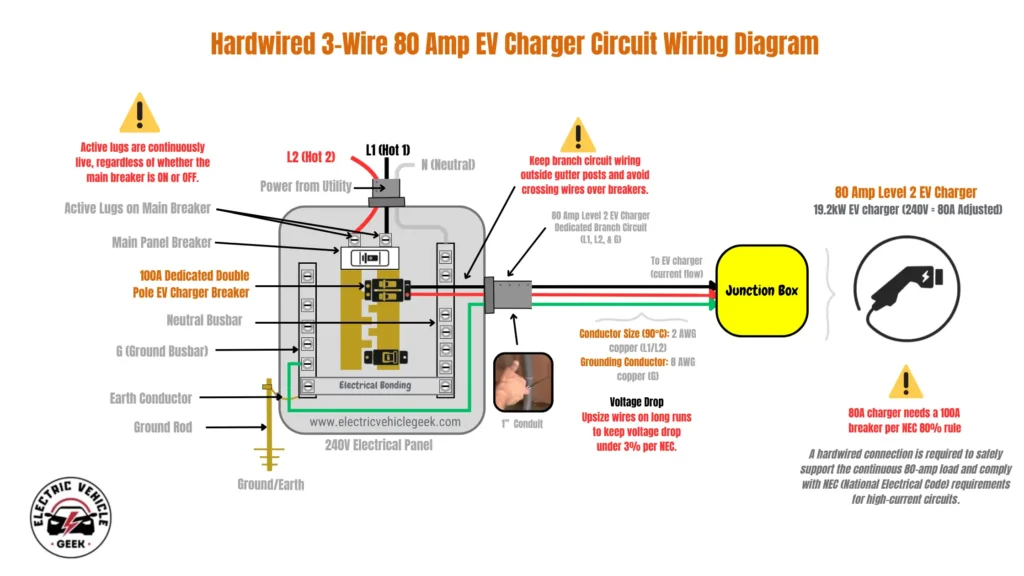
A 3-wire hardwired 240V 80-amp EV charger circuit does not require a neutral wire. Proper EV charger earthing is essential – ensure the grounding conductor is securely bonded to the panel’s ground busbar in full compliance with NEC Article 625 and local code.
Hardwired 4-Wire 80 Amp EV Charger Circuit Wiring Diagram
A hardwired 4-wire 80-amp EV charger circuit uses two 2 AWG solid copper hot wires (L1 and L2), one 2 AWG solid copper neutral (white), and one 8 AWG solid copper ground (green). These conductors are routed through conduit from a dedicated 100A circuit breaker to either a junction box or directly to the EV charger, as shown in the 80 Amp EV charger wiring diagram below:
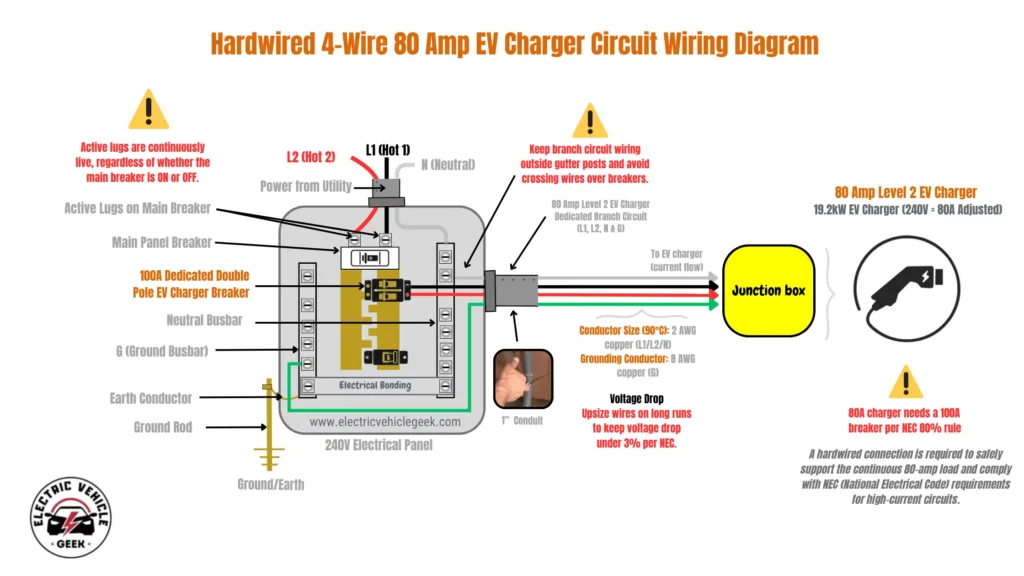
A neutral conductor is used to either power internal electronics or enable smart EV charging features, depending on the charger’s design. Proper EV charger earthing is essential and must comply with NEC Article 250 and Article 625 for safe operation.
Not Sure 80A EV Charger Is Right for You?
If your home, workplace, business, or commercial installation has limited electrical capacity or you want to avoid panel upgrades, consider a lower-amperage EV charger listed below. Level 1 EV chargers (12–16 amps) are great for overnight charging with standard outlets, while Level 2 EV chargers (16–50 amps) offer faster charging without the heavy-duty electrical requirements of an 80A EV charger installation.
120V, 12A, 1.44 kW
Adds approx. 3–8 miles of range per hour.
120V or 240V, 16A, 1.92–3.84 kW
Adds approx. 3–12 miles of range per hour
240V, 24A, 5.76 kW
Adds approx. 22 miles of range per hour
240V, 32A, 7.68 kW
Adds approx. 26 miles of range per hour
240V, 48A, 11.5 kW
Adds approx. 40 miles of range per hour
240V, 80A, 19.2 kW
Adds approx. 75 miles of range per hour
